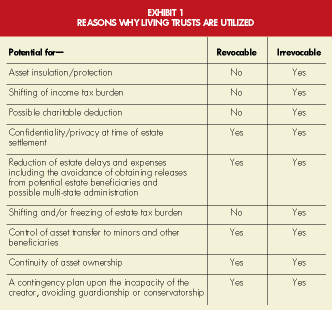
If a trust sells the residence, any gain is subject to capital gains tax and possibly the 3.8% net investment income tax (niit). If you are the beneficiary of the irrevocable trust, then you own the home and can deduct the taxes.

Trusts are not limited to a percentage of income (well, they are limited to 100% of the trust’s gross income), while with individuals, the deduction cannot be more than 60% of their adjusted gross income.
Tax deductions for irrevocable trust. Obtain an irrevocable trust tax id number, also known as federal tax id or the ein. Trusts, like estates, are a taxable entity. The appointed trustee needs to file the irrevocable trust taxes through the below process:
If you are the beneficiary of the irrevocable trust, then you own the home and can deduct the taxes. And, because the assets have been transferred to the trust, the grantor is relieved of the tax liability. A revocable trust becomes irrevocable when the grantor passes away.
An irrevocable trust is taxed as a legally independent entity, in much the same way as an individual taxpayer is taxed in terms of income tax rates and available deductions. Of the estate or trust. As stated earlier, for a trust to receive a charitable deduction, the deduction must be traceable back to trust gross income.
Taxation of trusts and their beneficiaries. Assuming the relevant rules applicable to trust charitable deductions are satisfied, giving through an irrevocable trust can allow an individual to fully utilize his or her full standard deduction while still obtaining a charitable deduction for gifts made. This capital gains exclusion is not available to trusts, only to individuals.
Also, trust income tax rates can be higher than for an individual. The tax cuts and jobs act (tcja) prohibits individual taxpayers from claiming miscellaneous itemized. It may/usually be protected in the event of a legal judgment against the grantor.
It is the beneficiary who will be taxed based on their personal tax filing status. And (2) the trust�s gross income must be reserved exclusively for charitable purposes. If the property taxes were, in fact, paid by the irrevocable trust, then certainly, the trust can take a deduction for taxes paid on its form 1041 tax return.
What expenses can an irrevocable trust deduct? Trusts have this same rule, but get a special break in the case of costs which are paid or incurred in connection with the administration of the trust that would not have been incurred if the trust. Taxation of estates & trusts.
You can deduct real estate/property taxes that you pay for the property that you own. From $9,151 to $12,500, you’ll pay $1,839 plus 35 percent of the amount over $9,150, and if your trust earned more than $12,500 in income, the tax will be $3,011.50 plus 37 percent of the excess. Repairs to real estate held by the trust some or all of the distributions made to the beneficiaries of the trust state, local, and real property taxes expenses of the estate administrative expenses, such as trustee fees
Can an irrevocable trust deduct mortgage interest? As noted above, an irrevocable trust must pay income tax on its earnings. However, a trust is also entitled to take a deduction for.
Employment taxes on wages paid to household. Alternatively, and depending on the language of the trust instrument, the property taxes paid by the. 9, 1969, unless they are from an estate that meets the exceptions stated in sec.
If the property taxes were, in fact, paid by the irrevocable trust, then certainly, the trust can take a deduction for taxes paid on its form 1041 tax return. So, for example, if a trust earns $10,000 in income during 2021 it would pay the following taxes: The income that is either accumulated or held for future distribution or distributed currently to the beneficiaries.
Trusts are not limited to a percentage of income (well, they are limited to 100% of the trust’s gross income), while with individuals, the deduction cannot be more than 60% of their adjusted gross income. The trust will also receive a deduction for distributing earnings. An irrevocable trust is taxed as a legally independent entity, in much the same way as an individual taxpayer is taxed in terms of income tax.
An irrevocable trust reduces the amount subject to estate taxes by removing assets from the grantor’s estate completely. Make sure that form 1065 (also known. Income tax return for estates and trusts.
For an irrevocable trust, which has an ein, trust tax rates can be avoided by paying/distributing out all earnings from the trust. Following are examples of deductions that trustees may be permitted to utilize on the trust’s income tax return: The standard rules apply to these four tax brackets.
Obtain form 1041 for the trustee and form 1065 for the beneficiaries. If a trust sells the residence, any gain is subject to capital gains tax and possibly the 3.8% net investment income tax (niit). The income, deductions, gains, losses, etc.
Evaluate whether the income amount exceeds $600 in the tax year. The new brackets are listed at the bottom of this article. Tax consequences of trust distributions.
Starting in 2018, under the new tax package passed by the republicans at the end of 2017, known as the tax cuts and jobs act, the tax brackets for 2018 and afterwards have changed slightly. It will constitute a reduction of distributable net income (or of taxable income). Any income tax liability of the estate or trust.
Generally speaking, if the irs considers the trust’s beneficiary and the trust to be the same. In some situations, an irrevocable trust might qualify for the exclusion.